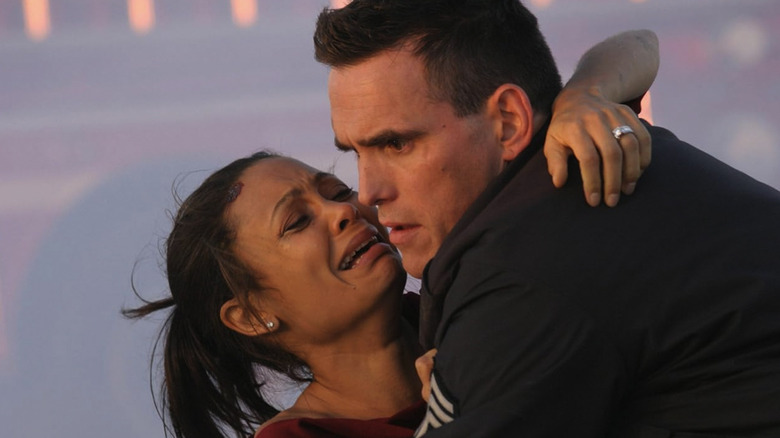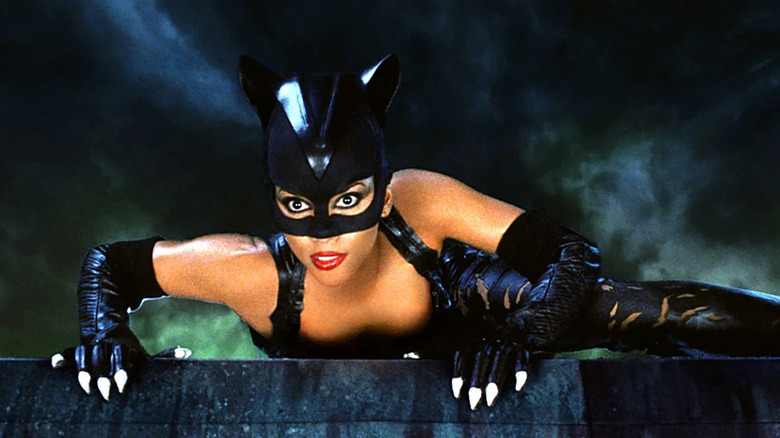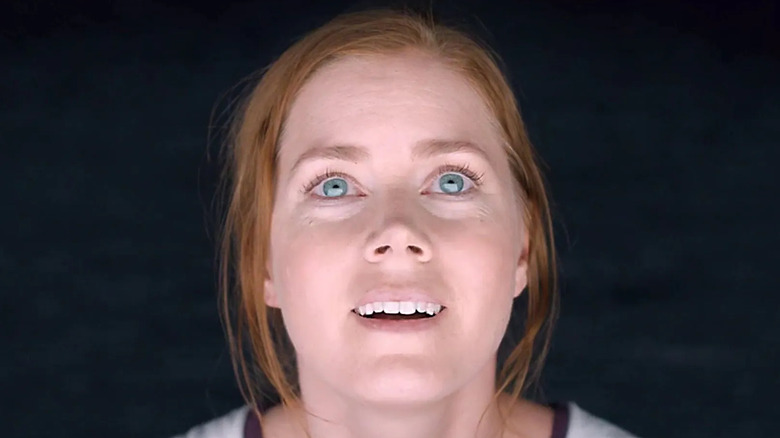What Is The Oscars Curse – And Is It Real?
For those with Hollywood dreams, whether it's acting in films or directing them, their biggest aspiration may be to win an Oscar. "Academy Award winner" would be forever attached to their name, and presumably, doors would open in their careers that had never opened before.
While the Oscars certainly recognize performers and filmmakers for their exceptional talents and place them in a class above the rest, they also bring high expectations. After winning, there will always be pressure to live up to that title, which may be impossible to achieve again. This is part of the dreaded "Oscar curse." What happens after you've achieved the biggest honor in Hollywood?
Oscar campaigns and wins can be just as much of a story as the movies themselves. Hollywood's publicity machine spins a specific narrative to help an artist win the coveted award — the higher the stakes or the more cultural impact, the better. There's the long overdue triumph of Martin Scorsese for "The Departed," young actors being nominated for breakthrough performances such as Anna Paquin, Tatum O'Neal, and Quvenzhané Wallis, or a celebration of the McConaissance, where Matthew McConaughey broke free of his romantic comedy trappings for more serious dramas. And while these stories of Oscar winners are often heartwarming to watch, what is often seen as the end goal of a career is actually just the beginning of a new phase, one that can either be a blessing or a curse. There are many different types of Oscar curses that, unfortunately, can be very real for many artists.
The curse of the post-Oscar decline
The most well-known Oscars curse is when actors or filmmakers experience a decline in their career after their win, or disappear from Hollywood altogether. One of the most egregious examples is Cuba Gooding Jr., who failed to capitalize on his Best Supporting Actor win for playing a larger-than-life athlete in Jerry Maguire. He's since appeared in bottom-of-the-barrel genre films such as "Snow Dogs," "Radio, "and "Norbit," and it took many years before he reemerged on pop culture's radar as O.J. Simpson in "American Crime Story: The People v. O. J. Simpson."
After soft-shoeing his way into Oscar voters' hearts as a waning silent movie star in "The Artist" and winning Best Actor, Jean Dujardin never found a solid footing in Hollywood. Despite making Oscars history for "Monster's Ball" as the first Black woman to win Best Actress, Halle Berry has been in a string of middling dramas and struggled to find blockbuster success in leading roles: "Catwoman" was a notable disaster, and her appearances in franchises like "X-Men" and John Wick were in supporting capacities.
Directors aren't immune to the curse, either. While also an actor, Kevin Costner won Best Director for his sweeping romance "Dances With Wolves." Yet he could never replicate that epic grandeur in his follow-up dystopian films, "The Postman," which nearly ended his career, and the box office bomb "Waterworld." The first part of his multi-part Western, "Horizon: An American Saga," was also a flop, a pale imitation of better films from the genre's heyday.
And Tom Hooper won Best Director for his rousing "The King's Speech," which depicts King George VI overcoming his stutter with such intimacy and compassion. However, he followed up his win with the garish "Les Misérables," misguided depictions of trans experience in "The Danish Girl," and the uncanny valley CGI nightmare of "Cats."
The curse of backlash
Best Picture is the heftiest award at the Oscars, a selection meant to encapsulate the best of an entire release year and the zeitgeist in some way. The biggest award of the night is also the biggest target for cinephiles if they're unhappy with the result. On their own, many of these films may be considered fine or acceptable, but when they are branded as "Best Picture," they're naturally more harshly scrutinized.
One of the most well-known controversies is the sexy romance "Shakespeare in Love" winning over Steven Spielberg's gritty war epic "Saving Private Ryan" in early 1999. The fluffy love story between the Bard and an aristocrat seemed frivolous against Spielberg's immersive portrayal of D-Day, with its handheld filming methods and blood splattering the camera. 2005's "Crash" has received similar backlash in the decades since, criticized as an overwrought drama with an obnoxious use of slow-motion and racial stereotypes, and dinged for winning over Ang Lee's heart-wrenching "Brokeback Mountain," which drew unfair controversy for being a gay romance.
There's been similar blowback over "Green Book" winning Best Picture in 2019, which led to fellow nominee Spike Lee walking off in disgust. His film "BlacKkKlansman" and Ryan Coogler's "Black Panther" were also nominated; two films made by Black men who poured their passion and intense perspectives into stories of Black heroes and history were cast aside in favor of a sanitized white-savior narrative directed by a white man, Peter Farrelly, who is primarily known for gross-out comedies like "Dumb & Dumber." Many films suffer from this curse of backlash — some justifiably so, some not. Either way, if a movie wins Best Picture that the majority of cinephiles disagree with, expect its legacy to become complicated very quickly.
The curse of being overdue
"It's an honor just to be nominated," many celebrities say, and while that's certainly true, we imagine it can also be frustrating to continually receive nominations but never win.
Glenn Close has been nominated eight times for both Best Supporting Actress and Best Actress, most recently for "Hillbilly Elegy," but she has never won. Amy Adams has been nominated six times, yet her career continues to falter with each new release, from the messy and misguided "Dear Evan Hansen" adaptation to the clumsy, toothless "Nightbitch." It seems she just can't find a project that will bring her back to that Oscar level.
Then there's the curse of being nominated too few times. Toni Collette was nominated for "The Sixth Sense" in 1999, but was criminally overlooked for "Hereditary." Horror had a surprisingly strong presence in the 2025 Oscar nominations, especially with Coralie Fargeat's bloodbath "The Substance," and it's a shame that in previous years the genre wasn't as recognized by the Academy. (Collette was also not nominated for her role as a depressed mum in "About a Boy.")
And finally, directors can fall victim to the so-called Oscars curse. David Fincher has been nominated three times for Best Director ("The Curse of Benjamin Button," "The Social Network," and "Mank") and has yet to win. It's hard to believe auteurs like Sofia Coppola and Spike Lee have only been nominated once for Best Director when they each have such masterful and identifiable styles and amazing filmographies. But sadly, this isn't surprising, given the uphill battle women and people of color face in securing nominations — a struggle that will hopefully continue to improve each year. To get so close but never quite attain your goal may be the worst curse of all.



